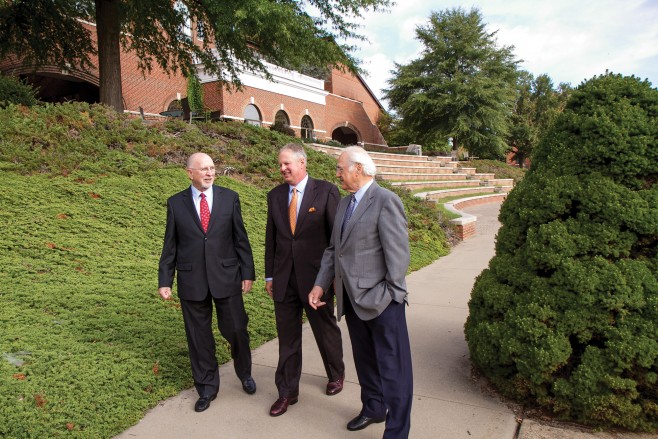
Joseph L. Lapp ’66, JD (left), walks beside his successor as president of EMU, Loren Swartzendruber ’76, MDiv’79, DMin, and Myron Augsburger ’55, MDiv, ThM, ThD, who was EMU’s fifth president, serving from 1965 to 1980. (Photo by Lindsey Kolb)
Of EMU’s eight presidents during its 98 years of existence, only one came from a career in a totally secular field. Law. This was president no. 7, Joseph L. Lapp ’66.
After graduating with a J.D. from the IIT Chicago-Kent College of Law in 1972, Lapp practiced law in several situations before becoming a partner in the firm of Souder, Rosenberger, Lapp and Bricker in Souderton, Pennsylvania. There he did such bread-and-butter law as general business and estate planning.
Two years after he began building his law practice – and just eight years after graduating from EMU as a history and Bible major – Lapp agreed to serve on EMU’s board of trustees.
Little did Lapp know back in 1974 that this affiliation would put his life on a track entirely different than he expected as a young lawyer with a growing practice in Souderton.
Six years later Lapp was elected board chair. Six more years, and he was appointed EMU’s seventh president, succeeding Richard Detweiler ’49.
Lapp knew what he was stepping into as president. And it wasn’t a ship-shape vessel. “Many people thought I was a fool to leave my practice and come to EMC [Eastern Mennonite College],” Lapp told Crossroads recently. Enrollment had dropped precipitously from 1980 to 1986, he noted, leaving it with only 774 students in 1986-87.
“Some said EMC should plan on being a college with 500 students,” he added. “But efficiency is impossible at that small of a size. Our aspirations were to offer high-quality education.”
When Lapp took the helm in July 1987, Eastern Mennonite College could have gone one of two ways:
(1) as Sweet Briar College did this year, when it announced it would focus on methodically closing down due to shriveling enrollment, or
(2) as James Madison University did, when it went from being a small women’s college founded in 1908 to growing rapidly in the 1960s, upon becoming fully coeducational and adding an array of graduate programs.
Lapp was determined that the demise of EMC would not happen on his watch. He was equally determined that the Anabaptist value base of EMC would not disappear.
“Many higher education institutions have removed Christian faith from the curriculum,” he said in comments published in Crossroads (fall ’94). “Eastern Mennonite believes the fusion of religion and the educational curriculum, especially in the private sector, contributes a set of values to the community that are beneficial to all.” He went on to talk about upholding “Christ’s call to a life of service and peacemaking.”
With Lapp’s law background, he set about seeking information, analyzing the facts, and asking tough questions about EMC’s situation. At a conference with other Christian colleges, he learned that some of them were doing well offering adult degree completion programs. In talking with his brother, John Lapp ’54, then head of Mennonite Central Committee (and profiled on page 62), Joe Lapp learned that MCC needed a place where its workers could get intensive training in conflict transformation theory and skills. From EMC’s seminary faculty he learned of the need for counseling education.
Lapp was backed by a strong cabinet, with Lee F. Snyder as his academic dean and vice president. “She was very important to me – her work ethic was outstanding, as was her judgment.” Ronald E. Piper, a CPA, was also key, “magic,” as vice president of finance.
Based on his research and wide consultations – with the trust and support of his cabinet and EMC’s board – Lapp led EMC through a remarkable series of changes from 1987 to 1995, including:
- Launching five new academic programs – the Intensive English Program, the Adult Degree Completion Program, and three master’s programs: counseling, conflict transformation, and education. (EMU’s first MBA program came later under Lapp’s presidency – in 1999.)
- Beginning the annual Summer Peacebuilding Institute with about 40 participants from a dozen countries in 1994. (As of 2014, there were 184 from 36 countries.)
- Hosting two new music programs that rapidly garnered acclaim for EMC: the Shenandoah Valley Bach Festival and the Shenandoah Valley Children’s Choir.
- Opening a site in Lancaster, Pennsylvania, for selected university-level studies and pastoral training.
- Starting the honors program for exceptional incoming undergraduates, with an anonymous $1 million gift.
- Changing the institution’s name to Eastern Mennonite University to reflect its growth from being a seminary and an undergraduate-focused college to being a full-fledged university with graduate programs.
As a result of this spate of initiatives between 1987 and 1995 – plus some others in subsequent years, including construction of the Seminary and the Commons – enrollment had doubled by the time Lapp wrapped up his 16 years as president, increasing from 774 undergraduate students when Lapp took office to 1,458 students in all programs in the spring of 2003.
“Joe Lapp led the rescue effort for this institution at a time when many people weren’t betting on its survival,” says Lapp’s successor, current EMU president Loren Swartzendruber, ’76, MDiv ’79, DMin. “Everyone who has come in Joe’s wake is indebted to the extraordinary efforts, wisdom, and far-sighted decisions made by him, his cabinet and the board of trustees. Where some others despaired, they saw hope and potential for EMU – their faith stands as a lesson to us all.”
After his presidency, Lapp did not return to practicing law. He joined the Harrisonburg office of what is now called Everence, a financial services firm, where as a Charitable Services Advisor he tapped some of his legal know-how in helping people with planned gifts and estate planning. In 2011, he became Everence’s managing director in Harrisonburg, supervising its office and staff.